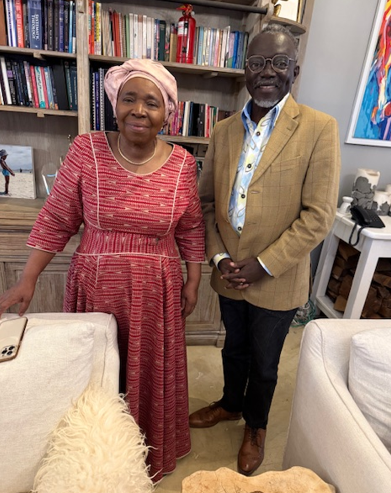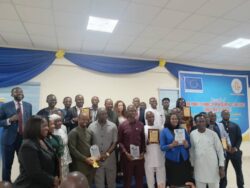…Until we build, we beg – a continent’s fate hangs between factories and dependency
When destiny leans forward, it does not shout; it whispers. And when the future whispers, wise nations listen. Africa is at such a moment.
In a meeting of strategic clarity and generational importance held in Johannesburg, two of the continent’s most influential minds, Professor Douglas Boateng, industrialisation advocate and boardroom governance expert, and Dr. Nkosazana Dlamini-Zuma, originator of the African Union’s Agenda 2063, convened to confront Africa’s developmental reality.
This was not a ceremonial encounter, nor another rehearsal of policy soundbites. It was a purpose-driven dialogue grounded in one pressing question: Can Africa afford to postpone its industrial future any longer?
It was a moment of honesty and a clarion call to course-correct before the cost of complacency becomes an inheritance of despair.
Strategic alignment around eight interconnected priorities
The exchange between Professor Boateng and Dr. Dlamini-Zuma centred on Africa’s developmental direction through eight interconnected priorities critical to the continent’s transformation.
These include: the African Continental Free Trade Area (AfCFTA), inclusive industrialisation, rural economic transformation, the UN Sustainable Development Goals (UNSDGs), and the Agenda 2063 blueprint.
The dialogue also underscored the importance of empowering women and youth, reclaiming control of Africa’s narrative through positive storytelling, and fostering a fundamental mindset shift around African identity, self-worth, and responsibility.
These pillars were not discussed as abstract ambitions but as urgent, actionable imperatives to reverse the paradox of a resource-rich continent marked by economic dependency and underutilised human capital.
A vision rooted in African reality
This was no diplomatic formality. It was a mirror held up to the continent’s soul. “Agenda 2063 was never about paper,” said Dr. Dlamini-Zuma. “It was and remains about purpose. About giving our grandchildren a functioning continent, not a deferred dream.” They reminded us that Africa cannot afford to be a continent of plans without products, dreams without delivery, or goals without grounded strategy.
From titles to tangible impact
“Leadership is not about titles or applause,” remarked Professor Boateng. “It is about foresight. About planting trees under whose shade, we may never sit.” True leadership, they agreed, must be defined by the courage to prepare for those yet unborn, not the convenience of short-term applause. It was an appeal to conscience: if we won’t lead for ourselves, let us lead for the African child yet to speak their first word.
The silence of rural Africa
Their dialogue pulled no punches on Africa’s quietest crisis: the abandonment of rural economies. “Our youth are not fleeing their homes,” said Dr. Dlamini-Zuma. “They are fleeing hopelessness. If we take roads, factories, and innovation to them, they will stay. They will build.” Neglecting the rural majority is not merely a policy failure; it is a betrayal of promise.
The cost of complacency
“We import what we can produce. We export what we should refine. It is poetic. And it is painful,” said Professor Boateng. “And tragically, it is preventable,” added Dr. Dlamini-Zuma. “Every unbuilt factory is a missed future. Africa does not need pity. It needs purposeful production.” The continent must stop trading excuses for progress. The time for ‘we will’ must give way to ‘we are.’
A synthesis of strategy
AfCFTA, Agenda 2063, and the UNSDGs must not be viewed as silos. They are complementary instruments of one African purpose. “AfCFTA must become more than a treaty,” insisted Dr. Dlamini-Zuma. “It must be the artery through which African productivity flows.”
“Development is not a theory,” echoed Boateng. “It is logistics. It is ports. It is accountability. These frameworks are not decorative; they are tools. And tools must be used.”
Integrating the skills revolution and reclaiming Africa’s narrative
No industrialisation journey is complete without a deliberate and sustained skills revolution. As highlighted in the evolving dialogue, Africa’s youth must no longer be passive observers of change. They must become the backbone of development, using their skills, creativity, innovation, and technology to drive progress across sectors. Equally urgent is the need to decolonise the African mindset. Africa must reclaim its narrative, tell its own stories, and write its own history.
Only by doing so can the continent begin to reverse the tragic paradox of a wealthy Africa and impoverished Africans. “Women must be visible and active in every area of human endeavour,” asserted Dr. Dlamini-Zuma. “Not just as recipients of policy, but as co-authors and enablers of Africa’s transformation; in politics, science, enterprise, and beyond.” These reflections reaffirm the essence of the broader agenda: a reimagined Africa that builds boldly, includes equitably, and rises confidently.
A new chapter: resolve over rhetoric
Their meeting closed without pomp, but its echo could stir generations. “Africa is not short on vision,” Professor Boateng concluded. “It is short on continuity. The continent must master consistency to break mediocrity’s hold.” “The Africa We Want is not a slogan,” reaffirmed Dr. Dlamini-Zuma. “It is a daily decision, one that must be made across ministries, boardrooms, farms, homes and schools.” This moment was not about speeches. It was about a shift. A whisper from the future demanding action from the present.
About the leaders
Dr. Nkosazana Dlamini-Zuma is the former Chairperson of the African Union Commission, a long-serving government minister, and the architect of Agenda 2063; Africa’s strategic roadmap for transformation. She continues to champion Pan-Africanism, women’s empowerment, and rural economic development. Professor Douglas Boateng is a globally recognised chartered engineer, a thought leading board room governance advocate, social entrepreneur, industrialisation strategist and author. He is a seasoned advisor to governments and institutions across the continent, advocating generational thinking, self-reliance, and value chain-led development.










